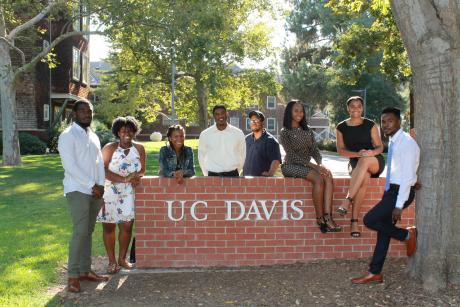Students from the Third Cohort of UCD-SPREE Conclude an Intensive Summer Research Program on Poverty and Inequality
September 14, 2017
DAVIS, Calif –
In August eight students from historically black colleges and universities (HBCUs) concluded a seven-week, intensive research program through the University of California, Davis Summer Poverty Research Engagement Experience (UCD-SPREE). Under the auspices of the program, UCD faculty provide mentorship and guidance to a select group of students to conduct research and prepare for the rigors of doctoral programs.
In final presentations to an academic audience, the students shared research results on poverty-related topics ranging from intergenerational trauma and its relationship to child health to the impact of the economic recession on women’s labor force participation, among others.
The students participating represent the third cohort of the program, which is a partnership between the UC Davis Center for Poverty Research (CPR) and Howard University, Spelman College and Morehouse College. The program aims to prepare promising undergraduates from HBCUs for academic careers and expand the number of HBCU applicants in University of California (UC) doctoral programs. The five-year average (2011-2015) for enrollment of students from HBCUs in UC doctoral programs was 2.9%. The program is funded by UCOP’s UC-HBCU Initiative.
Gaining skills to apply to graduate school
As in prior years of the program, each student worked with one faculty mentor and one graduate student mentor, heard weekly interdisciplinary poverty research presentations by UC Davis faculty, and participated in a series of professional development workshops focused on GRE preparation and practical skills for applying to graduate school, including policy writing and preparing a professional resume. Josephine Moreno, Graduate Diversity Officer in the Graduate Studies Department and a key contributor to the workshops emphasized the importance of the practical training. “SPREE has been essential in preparing these talented students for graduate studies,” she said.
Leah Hibel, Associate Professor in the Department of Human Ecology and faculty mentor for the program said, “SPREE gives students research skills and connections to the academic community. All of these skills are essential for someone interested in a career in academia, but as importantly, they are also transferrable to non-academic fields.”
Aquil Jones, a student from Morehouse College who was mentored by CPR Deputy Director Ann Stevens and conducted research on the impact of the Great Recession on women’s labor force participation, said that the program helped him prepare to apply to graduate school. “SPREE helped me learn to navigate the graduate school application process and provided tips for the statement of purpose and diversity statement, in addition to how to determine if a department is the right fit for you.”
Experience conducting research on key issues in poverty studies
An equal emphasis of the program focused on gaining practical skills for graduate school applications and real world research experiences. Students not only studied issues of current relevance in poverty research, they learned statistical techniques and programs to work with data and were engaged in the research process from start to finish.
Akila Forde, a student at Howard University, studied the relationship between labor force participation and marriage and divorce rates in the United States. She used publicly available data from the National Vital Statistics System and the American Community Survey and acquired the database from the Integrated Public Use Microdata Series (IPUMS).
Milan Harris, also of Howard University, applied logistic regression methods to data from a nationwide survey of 200 mothers to study the relationship between intergenerational trauma, or mothers’ adverse childhood experiences, and child behavior.
Professor Daniel Choe, Harris’ faculty mentor, said he was impressed with her resolve to study such an important issue. “Intergenerational trauma is a relatively new topic of empirical study, ripe with opportunity for exploration,” he said. “Milan learned how to conduct an empirical study from initial conception to presenting findings to an academic audience. This introduction to the rigors of academic research will equip her with the knowledge and skills needed to be successful.”
In addition to their methodological rigor, research projects were also novel and timely. Leah Hibel’s student looked at the relationship between perceived discrimination and sleep quality in Mexican-Americans. “In the current political climate Mexican-Americans are facing an increase in threats to their safety and security, and this is one of the first studies to impact how this affects sleep,” Hibel said.
Looking to the future of SPREE participants in UCD doctoral programs
One of the key aims of UCOP’s UC-HBCU Initiative is to increase the number of scholars enrolling in and completing UC doctoral programs. In this regard, the support of the UCD Black Graduate and Professional Students Association and the Office of Graduate Studies has been fundamental to the success of the program. Both the first and second cohorts of the program have resulted in admission to doctoral programs at UC Davis associated with the Center for Poverty Research.
After participation in SPREE’s third cohort, Aquil Jones said that the program changed his preferred graduate school choices. “My overall experience with the UCD-SPREE program was great, and I am now considering a few of the UC schools where as before I wasn’t considering any of the schools within the UC system,” he said.
Jeremy Prim, a PhD student in Sociology at UC Davis and an alumnus of the first UCD-SPREE cohort, said, “Simply put, the students that this program attracts are brilliant and are future groundbreaking scholars in their respective fields. I am excited for what the future holds for them.”
In addition to contributing to greater diversity across the UC system, UCD-SPREE has also been important in helping students reach their full potential. Ann Stevens, Deputy Director of CPR and SPREE program Director for the past three years said, “Each year I’ve been so impressed by how much these students can accomplish and learn in just seven weeks of research, and I am thrilled to see how much they enjoy the research process. Seeing SPREE participants return to our campus as PhD students is the greatest sign of the program’s success.”











